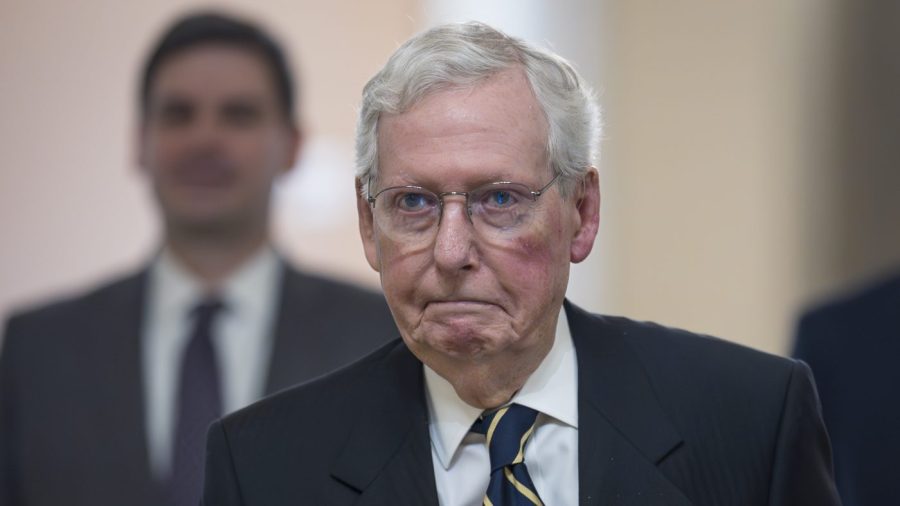[ad_1]

During Mitch McConnell’s first race for the Senate in 1984, President Ronald Reagan came to Kentucky and endorsed his good friend, “Mitch O’Donnell.” Vice President George H.W. Bush identified McConnell, incorrectly, as the mayor of Louisville.
Over the following four decades, no politician, Democrat or Republican, would make such a mistake again. And this week, McConnell stepped down as the longest-serving and one of the most historically important Senate leaders in history.
During his tenure as leader, McConnell secured passage of important bipartisan legislation. He negotiated compromises with the Obama administration that prevented a default on federal government debt; extended the George W. Bush-era tax cuts; and bailed out the financial services industry during the Great Recession. He worked with President Biden to get the Infrastructure Bill, the CHIPS Act and military aid to Ukraine through the Senate.
That said, as Michael Tackett implies in his new book, “The Price of Power: How Mitch McConnell Mastered the Senate, Changed America, and Lost His Party,” he has also caused considerable damage to democratic norms, practices and institutions.
While he was in college, McConnell wrote that the American government should insure “the BASIC RIGHTS OF ALL citizens, regardless of race, creed, or national origin.” He voted for Lyndon Johnson because Barry Goldwater opposed civil rights legislation.
In 2019 and 2020, however, McConnell refused to hold hearings on, let alone bring to the Senate floor, the Voting Rights Act passed by the House restoring the Department of Justice’s authority to “pre-clear” state voting laws that allegedly discriminate against people of color. McConnell insists that “nobody’s votes are being suppressed anywhere across America, in any of the states.” But in 2021, the Brennan Center for Justice identified 253 bills introduced, pending or passed that restrict voting access in 43 states.
In an op-ed published in 1973, McConnell claimed that “the lack of an overall limit on spending is an open invitation for special interests” to unduly influence candidates. We are “close” to being a “bought nation,” he added. He advocated excising the “cancer” of money in politics by publicly financing elections, limiting campaign contributions and mandating full disclosure by donors.
Two decades later, McConnell made an argument that, according to Tackett, became “the heart of his political identity”: Campaign spending is an act of free speech. He launched an all-out assault on the McCain-Feingold campaign finance bill. And he played a pivotal role in court challenges that resulted in Citizens United v. FEC, the Supreme Court’s 2010 decision that paved the way for virtually unlimited and often undisclosed “dark money” political contributions from millionaires and billionaires in political action committees, operating under the fiction that they are not coordinating with candidates or political parties.
Since then, campaign spending has skyrocketed, hitting a heretofore unimaginable $16 billion in the 2024 presidential and congressional races — and showing no signs of leveling off.
During the debate over Reagan’s nomination of Robert Bork to the Supreme Court in 1987, McConnell opined that senators should assess the character and professional qualifications of judicial nominees and defer to the president about their philosophy and ideology. Abiding by this standard “to avoid gridlock,” McConnell acknowledged, “I put myself in the position maybe a couple of years from now, of having to choke it down and support a well-qualified nominee whose views I find completely inappropriate.”
When a Democrat was in the White House, however, McConnell jettisoned this view. He blocked dozens of Obama’s nominees to federal courts. He is responsible for the appointment of almost as many appeals court judges during Trump’s single term as in Obama’s two terms.
After Justice Antonin Scalia died in February 2016, McConnell cited a rule that never existed — a Supreme Court vacancy should not be filled during a presidential election year — and refused to allow the Senate to consider Obama’s nominee, Merrick Garland. In 2017, when Democrats filibustered Neil Gorsuch, Trump’s choice to fill the seat, McConnell persuaded his colleagues to end the filibuster for Supreme Court nominees, and Gorsuch was confirmed by majority vote.
When Justice Ruth Bader Ginsburg died in September 2020, McConnell concocted another new rule: When the same party controls the Senate and the White House, proximity to a presidential election should not preclude consideration of a nominee. After a brief hearing, the Senate confirmed Amy Coney Barrett, giving the high court a conservative supermajority.
A week after the Jan. 6, 2021 assault on the Capitol, McConnell acknowledged in an oral history interview that “apparently you can impeach somebody after they leave office, and if that happens, there’s a second vote in the Senate, which only has to pass by a simple majority, that prevents that person from seeking office again.” If Trump “hasn’t committed indictable offenses,” he subsequently told Tackett, “I don’t know what one is.”
But when the impeachment vote was called on Feb. 13, McConnell did another about-face and declared that the Constitution did not prescribe such a penalty once a president left office. Perhaps he was afraid to break with the vast majority of his Republican colleagues in the Senate — and was betting that Trump had no future in politics.
McConnell, it now seems clear, made a catastrophic miscalculation. For some reason, he also decided to endorse Trump for reelection in 2024.
McConnell plans to serve out his term, which expires in 2027, albeit from a different seat in the Senate chamber. When he no longer has anything to lose, one wonders whether he will bend to the will of a president he has characterized as “unfit for office,” “stupid,” “despicable,” “a sleaze ball,” “a narcissist,” and “just about every quality you would not want somebody to have.”
Glenn C. Altschuler is the Thomas and Dorothy Litwin Emeritus Professor of American Studies at Cornell University.
[ad_2]
Source link

